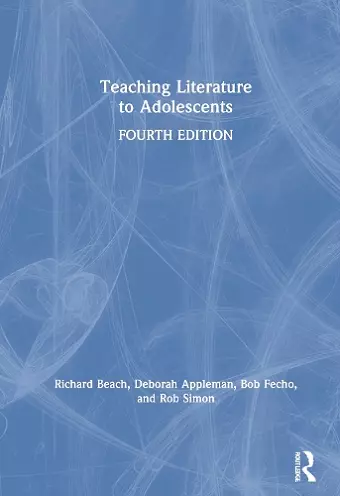Teaching Literature to Adolescents
Richard Beach author Rob Simon author Bob Fecho author Deborah Appleman author
Format:Hardback
Publisher:Taylor & Francis Ltd
Published:29th Dec '20
Currently unavailable, and unfortunately no date known when it will be back
This hardback is available in another edition too:
- Paperback£49.99(9780367366209)

Now in its fourth edition, this popular textbook introduces prospective and practicing English teachers to current methods of teaching literature in middle and high school classrooms. This new edition broadens its focus to cover important topics such as critical race theory; perspectives on teaching fiction, nonfiction, and drama; the integration of digital literacy; and teacher research for ongoing learning and professional development. It underscores the value of providing students with a range of different critical approaches and tools for interpreting texts. It also addresses the need to organize literature instruction around topics and issues of interest to today’s adolescents. By using authentic dilemmas and contemporary issues, the authors encourage preservice English teachers and their instructors to raise and explore inquiry-based questions that center on the teaching of a variety of literary texts, both classic and contemporary, traditional and digital.
New to the Fourth Edition:
- Expanded attention to digital tools, multimodal learning, and teaching online
- New examples of teaching contemporary texts
- Expanded discussion and illustration of formative assessment
- Revised response activities for incorporating young adult literature into the literature curriculum
- Real-world examples of student work to illustrate how students respond to the suggested strategies
- Extended focus on infusing multicultural and diverse literature in the classroom
Each chapter is organized around specific questions that preservice teachers consistently raise as they prepare to become English language arts teachers. The authors model critical inquiry throughout the text by offering authentic case narratives that raise important considerations of both theory and practice. A companion website, a favorite of English education instructors, http://teachingliterature.pbworks.com, provides resources and enrichment activities, inviting teachers to consider important issues in the context of their current or future classrooms.
Review #1: Rick Lybeck, Assistant Professor, Minnesota State University, USA.
“The volume’s critical sociocultural approach to teaching literature is exactly what’s needed in this era of high-stakes testing and accountability. Here, the spirit of literature as exploration is revivified through real-world examples and methods to help secondary students not only find meaning in the texts they’re reading, but to engage compelling aspects of politics, identity, and agency as they do.”
Review #2: Russell E. Greinke, Associate Professor of English, University of Central Missouri, USA.
“Here is why I use the BAFS book (that is how I abbreviate it on my syllabus): Other YA lit texts typically arrange chapters around subjects such as contemporary realistic fiction, historical fiction, biography, adventure, etc. I prefer topics such as reading, responding, evaluating, and assessing, so I am not stuck assigning books from rigid categories like “biography.” I like those straight-talking teacher vignettes, e.g., p. 3.”
[I would consider buying the fourth edition]. Consider a condensed version, though. The students need to spend most of the semester reading YA lit and planning how to teach specific works. To give thorough coverage to all 12 chapters of BAFS is a huge time bite.”
Review #3: Sabrina Jones, English Instructor, Marshall University, USA.
“There are some things I really like about this text. First, it emphasizes multiliteracy, and thus teaching a variety of literature types. It has activities for teaching social issues through YA fiction and using that as a vehicle for promoting action. This is very empowering for students. There’s also a fresh focus on digital media literacy. As technology grows, it is very important that teachers are able to grow with it and incorporate it in the classroom. I
particularly love the detailed use of lesson plans and classroom-ready activities in chapters 8 and 9. I would like to see more of this in other chapters.”
Review #4: David Bowles, Assistant Professor, University of Texas Río Grande Valley, USA.
“The attitude of the authors/editors toward students’ diversity—both demographic and in terms of reading/learning—is a powerful antidote to the overreliance on canon that they have experienced in other English courses. And the chapters are written in a style that eschews convoluted, academic-sounding prose for accessible and forthright discussions of the issues. Finally, to reiterate a point I made above, the immediate application of concepts in the form of lesson plans at the end of chapters is pretty fantastic.”
ISBN: 9780367366223
Dimensions: unknown
Weight: 725g
312 pages
4th edition